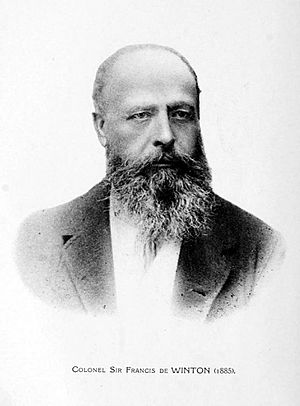Francis de Winton facts for kids
Quick facts for kids
Sir Francis de Winton
|
|
|---|---|

Sir Francis de Winton in 1885
|
|
| Born | 21 June 1835 Pitsford, Northamptonshire, United Kingdom |
| Died | 16 December 1901 (aged 66) Llanstephan, Llyswen, United Kingdom |
| Allegiance | |
| Service/ |
British Army |
| Years of service | 1854–1890 |
| Rank | Major-General |
| Unit | Royal Artillery |
| Battles/wars | Crimean War |
| Awards | Knight Grand Cross of the Order of St Michael and St George Companion of the Order of the Bath |
Sir Francis Walter de Winton (born June 21, 1835 – died December 16, 1901) was an important British Army officer. He also worked as a colonial administrator, helping to manage areas controlled by Britain. Later, he was a courtier, meaning he worked for the royal family. A big part of his career was serving as the Administrator-General of the Congo Free State for King Leopold II of Belgium.
Contents
Early Life and Education
Francis de Winton was born in Pitsford, Northamptonshire, in 1835. He was the second son of Walter de Winton. His father changed the family name to De Winton in 1839.
Francis went to the Royal Military Academy, Woolwich. This is a special school where people learn to become army officers. He joined the Royal Artillery on April 11, 1854.
Military Career Beginnings
De Winton first saw action in the Crimean War. He was part of the Siege of Sevastopol. For his bravery, he received the Légion d'Honneur, a special award from France.
He was promoted to captain in 1861. He served in British North America (which is now Canada) and Gibraltar. From 1877 to 1878, he worked as a military attache in Constantinople. This means he was a military expert working at an embassy.
Working with the Governor General
From 1878 to 1883, De Winton was secretary to the Marquess of Lorne. The Marquess of Lorne was the Governor General of Canada at that time.
De Winton was promoted to lieutenant-colonel in 1880. He became a brevet-colonel in 1884. He received special honors, becoming a Companion of the Order of St Michael and St George in 1882. He was made a knight in the same order in February 1884.
Career in Africa
After his time in Canada, Sir Francis de Winton took on important roles in different African colonies. He was most known for his work as the Administrator-General of the Congo Free State. Because of this, the Belgian government gave him the Commander of the Order of Leopold award.
In 1887, he led the Yoni Expedition in West Africa. This was a military operation against the Yoni people.
Later Military and Administrative Roles
After successfully dealing with the rebellion, he was made a Companion of the Order of the Bath. He also became Assistant Quartermaster-General at Army Headquarters.
In 1889, the British government sent De Winton as a commissioner to Swaziland. In May 1890, he retired from the army with the honorary rank of major-general. He was then appointed governor of the Imperial British East Africa Company's lands. However, he resigned from this role in June 1891.
Working for the Royal Family
In January 1892, De Winton became Controller and Treasurer for Prince Albert Victor, Duke of Clarence and Avondale. After the Duke's early death, De Winton continued to serve the royal family. He worked for the Duke and Duchess of York. He received another high honor, being invested as a Knight Grand Cross in 1893.
Personal Life and Legacy
While in Canada, Sir Francis de Winton was the Master of the Hounds for the Montreal Hunt. He was also the honorary secretary of the Royal Geographical Society from 1888 to 1889. The University of Cambridge gave him an honorary Legum Doctor degree.
He married Evelyn Rawson in 1864. They had two sons and two daughters. One of his sons passed away before him in 1892. Sir Francis de Winton died in Llanstephan, Llyswen, in 1901. He was buried in Glasbury.
A place in Canada, De Winton, Alberta, is named after him.
Sources
- Archive Francis de Winton, Royal museum of central Africa
 | Jackie Robinson |
 | Jack Johnson |
 | Althea Gibson |
 | Arthur Ashe |
 | Muhammad Ali |

